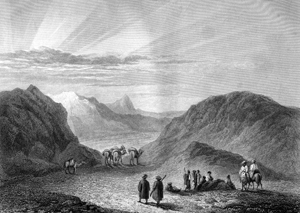"Part of the Stony Desert. Near Sockna"
This led to a valley, with some thick groves of acacias, and a plant like a mespilus, with pleasant and astringent berries: it is called by the natives butomo. From this we passed over a low hill, into the valley Niffud. This valley has been the seat of much fighting, as our conductors informed us, among the Arabs of different tribes. We left the valley, by a pass to the southward, and entered an extensive plain, named Ambulum: in this we travelled the whole day. The surface, in some places, a firm sand, with here and there rocky eminences, and patches of gravel: the latter was fine, and mixed with fragments of shells. Often, for a considerable extent, not the least of vegetation; and in no place was the ground completely covered, except in a few oases, where there was a species of grass, of the genus festuca. [p. xvi]
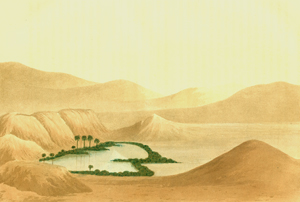
“View of the Bahir Mandia. From the North”
Clapperton was sitting on the top of a high sand hill, and so pleased with the view, that he called out several times for me to dismount from my camel to enjoy the treat. The appearance was beautiful. A deep sandy valley, without vegetation, and containing only two large groves of date trees; within each a fine lake was enclosed. The contrast between the bare lofty sand hills, and the two insulated spots, was the great cause of the sensation of beauty. There is something pretty in a lake surrounded with date palms; but when every other object within the sphere of vision is dreary, the scene becomes doubly so. [p. lviii]
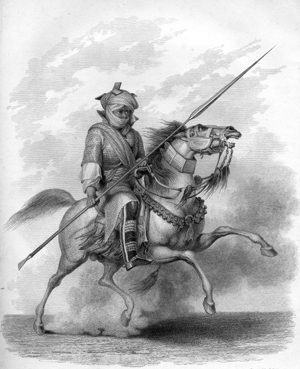
“Body Guard of the Sheikh of Bornou”
The sheikh’s negroes, as they were called, meaning the black chiefs and favourites, all raised to that rank by some deed of bravery, were habited in coats of mail composed of iron chain, which covered them from the throat to the knees, dividing behind, and coming on each side of the horse: some of them had helmets, or rather skull-caps, of the same metal, with chin-pieces, all sufficiently strong to ward off the shock of a spear. Their horses’ heads were also defended by plates of iron, brass, and silver, just leaving sufficient room for the eyes of the animal. [p. 64]
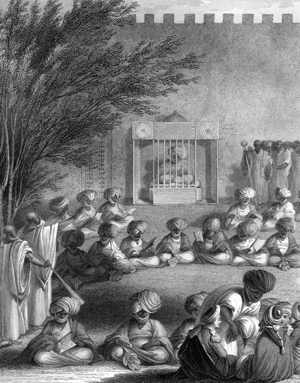
“Reception of the Mission. By the Sultan of Bornou”
March 3 [1823].— Soon after daylight we were summoned to attend the Sultan of Bornou. He received us in an open space in front of the royal residence: we were kept at a considerable distance while his people approached to within about 100 yards, passing first on horseback; and after dismounting and prostrating themselves before him, they took their places on the ground in front, but with their backs to the royal person, which is the custom in the country. He was seated in a sort of cage of cane or wood, near the door of his garden, on a seat which at the distance appeared to be covered with silk or satin, and through the railing looked upon the assembly before him. . . . Nothing could be more absurd and grotesque than some, nay all, of the figures who formed his court. Here was all the outward show of pomp and grandeur, without one particle of the staple commodity, power, to plead its excuse; he reigns and governs by the sufferance of the sheikh: and the better to answer his views, by making him more popular with all parties, the sultan is amused by indulging in all the folly and bigotry of the ancient negro sovereigns. Large bellies and large heads are indispensable for those who serve the court of Bornou. . . . Nothing could be more ridiculous than the appearance of these people squatting down in their places, tottering under the weight and magnitude of their turbans and their bellies, while the thin legs that appeared underneath but ill accorded with the bulk of the other parts. [pp. 78-79]
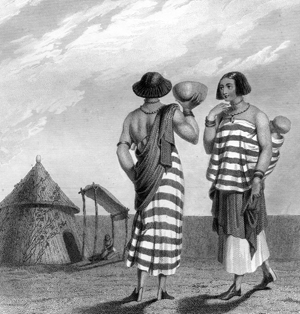
"Shouaa Women, Kingdom of Bornou"
The Shouaas Arabs are a very extraordinary race, and have scarcely any resemblance to the Arabs of the north: they have fine open countenances, with aquiline noses and large eyes; their complexion is a light copper colour: they possess great cunning with their courage and resemble in appearance some of the most favoured gypsies in England, particularly the women, and their Arabic is nearly pure Egyptian. [p.94]
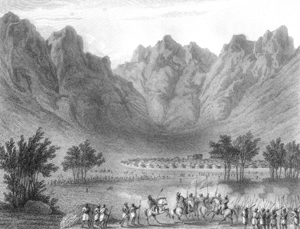
"Arrival at Mora. The Capital of Mandara"
Through an open space, or break in the wood, I had this day seen part of the Mandara hills . . . We were now but a few miles from the capital of Mandara . . . At about a mile from this town, we saw before us the sultan of Mandara, surrounded by about five hundred horsemen, posted on a rising ground ready to receive us . . . Different parties now charged up to the front of our line, and wheeling suddenly around, charged back again to the sultan. These people were finely dressed in Soudan tobes of different colours; dark blue, and striped with yellow and red; bornouses of coarse scarlet cloth; with large turbans of white or dark coloured cotton. Their horses were really beautiful, larger and more powerful than any thing found in Bornou, and they managed them with great skill. The sultan's guard was composed of thirty of his sons, all mounted on very superior horses, clothed in striped silk tobes; and the skin of the tiger-cat and leopard forming their shabracks, which hung fully over their horses' haunches. After these had returned to their station in front of the sultan, we approached at full speed in our turn, halting with the guard between us and the royal presence. [pp. 110-111]
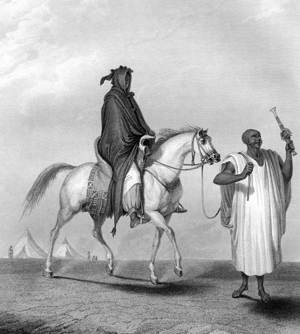
"A Favorite of the Seraglio Accompanying a Military Expedition"
Close in the rear of the maherhies follow the eunuchs and the harem; the sheikh takes but three wives, who are mounted, astride, on small trained horses, each led by a boy-slave, or eunuch, — their heads and figures completely enveloped in brown silk bornouses, and a eunuch riding by the side of each. The sultan of Bornou has five times as many attendants, and his harem is three times as numerous: he is attended, also, by men bearing trumpets (frumfrum), of hollow wood, ten and twelve feet long; with these a kind of music is kept up. [p. 163]
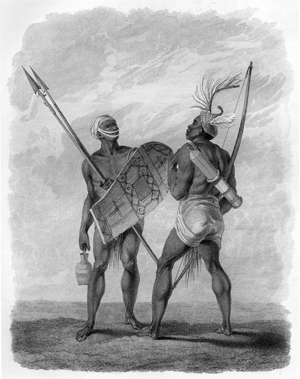
"Kanemboo Spearman. Munga Bowman. In the Service of the Sheikh of Bornou"
The sun had scarcely risen this morning, when the sheikh was on horseback inspecting his favourite troops, the Kanemboo infantry . . . They were perfectly naked, with the exception of a rather fantastical belt of the goat or sheep's skin, with the hair outwards, round their middles, and a few gubkas (narrow strips of cloth, the money of the country), round their heads, and brought under the nose; their arms are a spear and shield, with a dagger on the left arm reversed, secured by a ring which goes on the wrist, the point running up the arm, and the handle downwards. The shields are made of the wood of the fogo, a tree which grows in the shallow waters of the great lake, and are extremely light, as to weigh only a few pounds . . . Under cover of these the Kanemboo attack the bowmen with great order, and at a slow pace. Their leaders are mounted, and are distinguished merely by a tobe of dark blue, and a turban of the same colour. [pp. 165-166]
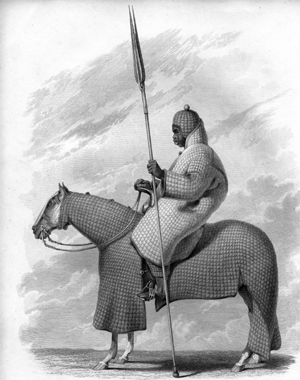
"Lancers of the Sultan of Begharmi"
They were attended by more than a dozen slaves, bearing presents for us, King George, and the consul at Tripoli. I had applied for a lebida (horse covering), after seeing those taken from the Berghamis: the sheikh now sent a man, clothed in a yellow wadded jacket, with a scarlet cap, and mounted on the horse taken from the Berghamis, on which the sultan's oldest son rode. He was one of the finest horses I had seen; and covered with a scarlet cloth, also wadded. [pp. 279-280]
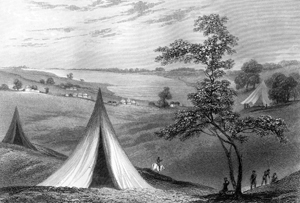
“Encampment Near Woodie. And Part of the Lake Tchad” [This is the first European eye-witness view of Lake Chad.]
I had now been six days at Woodie, waiting the arrival of my companions with our camels, and the kafila of merchants whom we were to accompany to Fezzan. Woodie is no very pleasant place of sojourn, as the Biddomah have a sort of agreement with the kaid to be allowed to plunder all strangers and travellers, provided the property of the inhabitants is respected. We were, however, told to be on our guard, and not without reason. Our tents were pitched near each other, and a look-out kept up the whole night, notwithstanding which they paid us a visit, during a storm of thunder and rain, and from the entrance of Bellal’s tent, only eight paces from my own, stole both his horses. [p. 289]
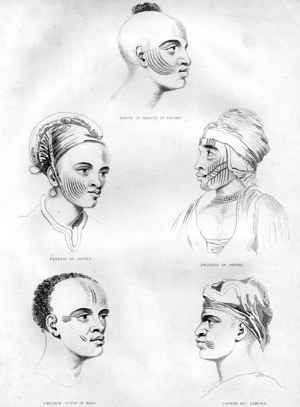
[facial features of people in the Kano area]
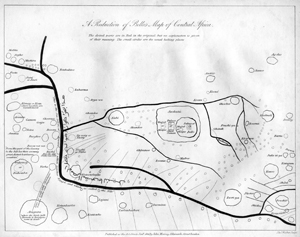
"A Reduction of Bello's Map of Central Africa" [facing p. 109 of Clapperton's journal]
